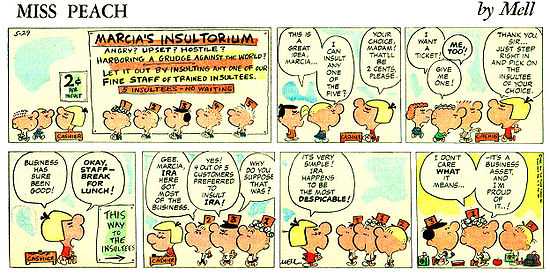Mell Lazarus

Mell Lazarus (born May 3, 1927)[1] is an American novelist and cartoonist, best known as the creator of two comic strips, Miss Peach (1957–2002) and Momma (1970–present). For his comic strip Pauline McPeril (a 1966-69 collaboration with Jack Rickard), he used the pseudonym Fulton, which also the name of a character in his novel, The Boss Is Crazy, Too.
A native of Brooklyn, Lazarus began as a professional cartoonist when he was a teenager. During his twenties, he worked for Al Capp and his brother Elliott Caplin at the Capp family-owned Toby Press, which published Al Capp's Shmoo Comics, among other titles.
In 1964, Lazarus talked about his background and working methods:
- I never actually graduated high school. My art teacher flunked me. I have since, however, attended many classes of one kind or another. I frequently lecture at colleges and to other groups around the country. I sold my first cartoon when I was 16. I did commercial art and edited children’s magazines prior to February 4, 1957 when my comic, Miss Peach, was launched. The characters in Miss Peach are not actually modeled on real persons, with the possible exception of Lester, the skinny kid in the strip. Possibly the most loved character is Arthur, the dopey little kid. I make notes all week based on thoughts, conversational fragments, etc. I sift through all these notes on Monday mornings and select several to develop. I then write gags for them. I do six daily strips and a Sunday page.[2]
Books
His novel The Boss Is Crazy, Too (Dial, 1954) was inspired in part by his experiences as an editor at Toby Press. mike weber described the storyline:
- Mel Lazarus' great novel of the early days of the Silver Age, The Boss Is Crazy Too, features a production manager who literally knows nothing about his job; he's the publisher's wife's unemployable cousin, and giving him a job is part of the price of getting family money to keep the company afloat. The artists hate him, and the inker has a habit of lettering obscenities in areas that are going to be solid black, just to honk him off. He's positive that, one day, the black isn't going to cover it up. So one week, the bullpen crew grab one of the sample bundles of comics coming into the office, and, with a rubber stamp and dark grey ink, stamp an obscene word in the same place in a black doorway the hero has just emerged from, gun blazing. And then they tie the bundle back up and leave him to find it.[3]
The Neighborhood Watch (Doubleday, 1986) is about an impoverished Brooklyn writer who steals from his wealthy neighbors. It was once optioned for a film. Publishers Weekly reviewed:
- Loring Neiman, writer, widowed father, good neighbor, is also a thief. That is to say, when his book is rejected and the mortgage is in default, Neiman starts to rob his neighbors, and discovers that he is very good at his new craft. Lazarus... depicts his protagonist as a sympathetic, sensitive and earnest person, and he peoples Neiman's Brooklyn neighborhood with a pleasant collection of Jewish characters who are just on the safe side of predictable. After Neiman becomes involved in an affair with a married woman, he decides to give up his criminal activities, but one neighbor with a shady past forces him to do one more job. Wry and modestly entertaining, the novel fails to build to a forceful ending, cashing in instead with a somewhat mushy courtroom climax.[4]
Awards
Lazarus served as President of the National Cartoonists Society for two consecutive terms from 1989 to 1993. He won the National Cartoonists Society's Humor Comic Strip Award for 1973 and 1979. He was given the Reuben Award for Outstanding Cartoonist of the Year for his work on Miss Peach in 1981, and he received their Silver T-Square Award in 2000.
A member of Mensa,[5] Lazarus has lived in Los Angeles since the 1970s. He has three daughters.
References
- ↑ Comics Buyer's Guide #1485; May 3, 2002; Page 29
- ↑ Willette, Allen. These Top Cartoonists Tell How They Create America’s Favorite Comics. Allied Publications, 1964.
- ↑ Weber, Mike. Comicmix
- ↑ Publishers Weekly, 1986.
- ↑ Mahalo
External links
|